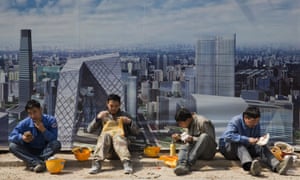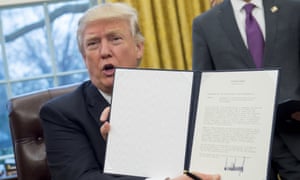The annual January gathering of the World Economic Forum in Davos is usually a placid affair: a place for well-heeled participants to exchange notes on global business opportunities, or powder conditions on the local ski slopes, while cradling champagne and canapes. This January, the ultra-rich and the sparkling wine returned, but by all reports the mood was one of anxiety, defensiveness and self-reproach.
The future of economic globalisation, for which the Davos men and women see themselves as caretakers, had been shaken by a series of political earthquakes. “Globalisation” can mean many things, but what lay in particular doubt was the long-advanced project of increasing free trade in goods across borders. The previous summer, Britain had voted to leave the largest trading bloc in the world. In November, the unexpected victory of Donald Trump, who vowed to withdraw from major trade deals, appeared to jeopardise the trading relationships of the world’s richest country. Forthcoming elections in France and Germany suddenly seemed to bear the possibility of anti-globalisation parties garnering better results than ever before. The barbarians weren’t at the gates to the ski-lifts yet – but they weren’t very far.
In a panel titled Governing Globalisation, the economist Dambisa Moyo, otherwise a well-known supporter of free trade, forthrightly asked the audience to accept that “there have been significant losses” from globalisation. “It is not clear to me that we are going to be able to remedy them under the current infrastructure,” she added. Christine Lagarde, the head of the International Monetary Fund, called for a policy hitherto foreign to the World Economic Forum: “more redistribution”. After years of hedging or discounting the malign effects of free trade, it was time to face facts: globalisation caused job losses and depressed wages, and the usual Davos proposals – such as instructing affected populations to accept the new reality – weren’t going to work. Unless something changed, the political consequences were likely to get worse.
The backlash to globalisation has helped fuel the extraordinary political shifts of the past 18 months. During the close race to become the Democratic party candidate, senator Bernie Sanders relentlessly attacked Hillary Clinton on her support for free trade. On the campaign trail, Donald Trump openly proposed tilting the terms of trade in favour of American industry. “Americanism, not globalism, shall be our creed,” he bellowed at the Republican national convention last July. The vote for Brexit was strongest in the regions of the UK devastated by the flight of manufacturing. At Davos in January, British prime minister Theresa May, the leader of the party of capital and inherited wealth, improbably picked up the theme, warning that, for many, “talk of greater globalisation … means their jobs being outsourced and wages undercut.” Meanwhile, the European far righthas been warning against free movement of people as well as goods. Following her qualifying victory in the first round of France’s presidential election, Marine Le Pen warned darkly that “the main thing at stake in this election is the rampant globalisation that is endangering our civilisation.”
It was only a few decades ago that globalisation was held by many, even by some critics, to be an inevitable, unstoppable force. “Rejecting globalisation,” the American journalist George Packer has written, “was like rejecting the sunrise.” Globalisation could take place in services, capital and ideas, making it a notoriously imprecise term; but what it meant most often was making it cheaper to trade across borders – something that seemed to many at the time to be an unquestionable good. In practice, this often meant that industry would move from rich countries, where labour was expensive, to poor countries, where labour was cheaper. People in the rich countries would either have to accept lower wages to compete, or lose their jobs. But no matter what, the goods they formerly produced would now be imported, and be even cheaper. And the unemployed could get new, higher-skilled jobs (if they got the requisite training). Mainstream economists and politicians upheld the consensus about the merits of globalisation, with little concern that there might be political consequences.
Back then, economists could calmly chalk up anti-globalisation sentiment to a marginal group of delusional protesters, or disgruntled stragglers still toiling uselessly in “sunset industries”. These days, as sizable constituencies have voted in country after country for anti-free-trade policies, or candidates that promise to limit them, the old self-assurance is gone. Millions have rejected, with uncertain results, the punishing logic that globalisation could not be stopped. The backlash has swelled a wave of soul-searching among economists, one that had already begun to roll ashore with the financial crisis. How did they fail to foresee the repercussions?
In the heyday of the globalisation consensus, few economists questioned its merits in public. But in 1997, the Harvard economist Dani Rodrik published a slim book that created a stir. Appearing just as the US was about to enter a historic economic boom, Rodrik’s book, Has Globalization Gone Too Far?, sounded an unusual note of alarm.
Rodrik pointed to a series of dramatic recent events that challenged the idea that growing free trade would be peacefully accepted. In 1995, France had adopted a programme of fiscal austerity in order to prepare for entry into the eurozone; trade unions responded with the largest wave of strikes since 1968. In 1996, only five years after the end of the Soviet Union – with Russia’s once-protected markets having been forcibly opened, leading to a sudden decline in living standards – a communist won 40% of the vote in Russia’s presidential elections. That same year, two years after the passing of the North American Free Trade Agreement (Nafta), one of the most ambitious multinational deals ever accomplished, a white nationalist running on an “America first” programme of economic protectionism did surprisingly well in the presidential primaries of the Republican party.
What was the pathology of which all of these disturbing events were symptoms? For Rodrik, it was “the process that has come to be called ‘globalisation’”. Since the 1980s, and especially following the collapse of the Soviet Union, lowering barriers to international trade had become the axiom of countries everywhere. Tariffs had to be slashed and regulations spiked. Trade unions, which kept wages high and made it harder to fire people, had to be crushed. Governments vied with each other to make their country more hospitable – more “competitive” – for businesses. That meant making labour cheaper and regulations looser, often in countries that had once tried their hand at socialism, or had spent years protecting “homegrown” industries with tariffs.
 Anti-globalisation protesters in Seattle, 1999. Photograph: Eric Draper/AP
Anti-globalisation protesters in Seattle, 1999. Photograph: Eric Draper/APThese moves were generally applauded by economists. After all, their profession had long embraced the principle of comparative advantage – simply put, the idea countries will trade with each other in order to gain what each lacks, thereby benefiting both. In theory, then, the globalisation of trade in goods and services would benefit consumers in rich countries by giving them access to inexpensive goods produced by cheaper labour in poorer countries, and this demand, in turn, would help grow the economies of those poorer countries.
But the social cost, in Rodrik’s dissenting view, was high – and consistently underestimated by economists. He noted that since the 1970s, lower-skilled European and American workers had endured a major fall in the real value of their wages, which dropped by more than 20%. Workers were suffering more spells of unemployment, more volatility in the hours they were expected to work.
While many economists attributed much of the insecurity to technological change – sophisticated new machines displacing low-skilled workers – Rodrik suggested that the process of globalisation should shoulder more of the blame. It was, in particular, the competition between workers in developing and developed countries that helped drive down wages and job security for workers in developed countries. Over and over, they would be held hostage to the possibility that their business would up and leave, in order to find cheap labour in other parts of the world; they had to accept restraints on their salaries – or else. Opinion polls registered their strong levels of anxiety and insecurity, and the political effects were becoming more visible. Rodrik foresaw that the cost of greater “economic integration” would be greater “social disintegration”. The inevitable result would be a huge political backlash.
As Rodrik would later recall, other economists tended to dismiss his arguments – or fear them. Paul Krugman, who would win the Nobel prize in 2008 for his earlier work in trade theory and economic geography, privately warned Rodrik that his work would give “ammunition to the barbarians”.
It was a tacit acknowledgment that pro-globalisation economists, journalists and politicians had come under growing pressure from a new movement on the left, who were raising concerns very similar to Rodrik’s. Over the course of the 1990s, an unwieldy international coalition had begun to contest the notion that globalisation was good. Called “anti-globalisation” by the media, and the “alter-globalisation” or “global justice” movement by its participants, it tried to draw attention to the devastating effect that free trade policies were having, especially in the developing world, where globalisation was supposed to be having its most beneficial effect. This was a time when figures such as the New York Times columnist Thomas Friedman had given the topic a glitzy prominence by documenting his time among what he gratingly called “globalutionaries”: chatting amiably with the CEO of Monsanto one day, gawking at lingerie manufacturers in Sri Lanka the next. Activists were intent on showing a much darker picture, revealing how the record of globalisation consisted mostly of farmers pushed off their land and the rampant proliferation of sweatshops. They also implicated the highest world bodies in their critique: the G7, World Bank and IMF. In 1999, the movement reached a high point when a unique coalition of trade unions and environmentalists managed to shut down the meeting of the World Trade Organization in Seattle.
In a state of panic, economists responded with a flood of columns and books that defended the necessity of a more open global market economy, in tones ranging from grandiose to sarcastic. In January 2000, Krugman used his first piece as a New York Times columnist to denounce the “trashing” of the WTO, calling it “a sad irony that the cause that has finally awakened the long-dormant American left is that of – yes! – denying opportunity to third-world workers”.
Where Krugman was derisive, others were solemn, putting the contemporary fight against the “anti-globalisation” left in a continuum of struggles for liberty. “Liberals, social democrats and moderate conservatives are on the same side in the great battles against religious fanatics, obscurantists, extreme environmentalists, fascists, Marxists and, of course, contemporary anti-globalisers,” wrote the Financial Times columnist and former World Bankeconomist Martin Wolf in his book Why Globalization Works. Language like this lent the fight for globalisation the air of an epochal struggle. More common was the rhetoric of figures such as Friedman, who in his book The World is Flat mocked the “pampered American college kids” who, “wearing their branded clothing, began to get interested in sweatshops as a way of expiating their guilt”.
Arguments against the global justice movement rested on the idea that the ultimate benefits of a more open and integrated economy would outweigh the downsides. “Freer trade is associated with higher growth and … higher growth is associated with reduced poverty,” wrote the Columbia University economist Jagdish Bhagwati in his book In Defense of Globalization. “Hence, growth reduces poverty.” No matter how troubling some of the local effects, the implication went, globalisation promised a greater good.
The fact that proponents of globalisation now felt compelled to spend much of their time defending it indicates how much visibility the global justice movement had achieved by the early 2000s. Still, over time, the movement lost ground, as a policy consensus settled in favour of globalisation. The proponents of globalisation were determined never to let another gathering be interrupted. They stopped meeting in major cities, and security everywhere was tightened. By the time of the invasion of Iraq, the world’s attention had turned from free trade to George Bush and the “war on terror,” leaving the globalisation consensus intact.
Above all, there was a widespread perception that globalisation was working as it was supposed to. The local adverse effects that activists pointed to – sweatshop labour, starving farmers – were increasingly obscured by the staggering GDP numbers and fantastical images of gleaming skylines coming out of China. With some lonely exceptions – such as Rodrik and the former World Bank chief and Columbia University professor Joseph Stiglitz – the pursuit of freer trade became a consensus position for economists, commentators and the vast majority of mainstream politicians, to the point where the benefits of free trade seemed to command blind adherence. In a 2006 TV interview, Thomas Friedman was asked whether there was any free trade deal he would not support. He replied that there wasn’t, admitting, “I wrote a column supporting the Cafta, the Caribbean Free Trade initiative. I didn’t even know what was in it. I just knew two words: free trade.”
In the wake of the financial crisis, the cracks began to show in the consensus on globalisation, to the point that, today, there may no longer be a consensus. Economists who were once ardent proponents of globalisation have become some of its most prominent critics. Erstwhile supporters now concede, at least in part, that it has produced inequality, unemployment and downward pressure on wages. Nuances and criticisms that economists only used to raise in private seminars are finally coming out in the open.
A few months before the financial crisis hit, Krugman was already confessing to a “guilty conscience”. In the 1990s, he had been very influential in arguing that global trade with poor countries had only a small effect on workers’ wages in rich countries. By 2008, he was having doubts: the data seemed to suggest that the effect was much larger than he had suspected.
In the years that followed, the crash, the crisis of the eurozone and the worldwide drop in the price of oil and other commodities combined to put a huge dent in global trade. Since 2012, the IMF reported in its World Economic Outlook for October 2016, trade was growing at 3% a year – less than half the average of the previous three decades. That month, Martin Wolf argued in a column that globalisation had “lost dynamism”, due to a slackening of the world economy, the “exhaustion” of new markets to exploit and a rise in protectionist policies around the world. In an interview earlier this year, Wolf suggested to me that, though he remained convinced globalisation had not been the decisive factor in rising inequality, he had nonetheless not fully foreseen when he was writing Why Globalization Works how “radical the implications” of worsening inequality “might be for the US, and therefore the world”. Among these implications appears to be a rising distrust of the establishment that is blamed for the inequality. “We have a very big political problem in many of our countries,” he said. “The elites – the policymaking business and financial elites – are increasingly disliked. You need to make policy which brings people to think again that their societies are run in a decent and civilised way.
That distrust of the establishment has had highly visible political consequences: Farage, Trump, and Le Pen on the right; but also in new parties on the left, such as Spain’s Podemos, and curious populist hybrids, such as Italy’s Five Star Movement. As in 1997, but to an even greater degree, the volatile political scene reflects public anxiety over “the process that has come to be called ‘globalisation’”. If the critics of globalisation could be dismissed before because of their lack of economics training, or ignored because they were in distant countries, or kept out of sight by a wall of police, their sudden political ascendancy in the rich countries of the west cannot be so easily discounted today.
Over the past year, the opinion pages of prestigious newspapers have been filled with belated, rueful comments from the high priests of globalisation – the men who appeared to have defeated the anti-globalisers two decades earlier. Perhaps the most surprising such transformation has been that of Larry Summers. Possessed of a panoply of elite titles – former chief economist of the World Bank, former Treasury secretary, president emeritus of Harvard, former economic adviser to President Barack Obama – Summers was renowned in the 1990s and 2000s for being a blustery proponent of globalisation. For Summers, it seemed, market logic was so inexorable that its dictates prevailed over every social concern. In an infamous World Bank memo from 1991, he held that the cheapest way to dispose of toxic waste in rich countries was to dump it in poor countries, since it was financially cheaper for them to manage it. “The laws of economics, it’s often forgotten, are like the laws of engineering,” he said in a speech that year at a World Bank-IMF meeting in Bangkok. “There’s only one set of laws and they work everywhere. One of the things I’ve learned in my short time at the World Bank is that whenever anybody says, ‘But economics works differently here,’ they’re about to say something dumb.”
Over the last two years, a different, in some ways unrecognizable Larry Summers has been appearing in newspaper editorial pages. More circumspect in tone, this humbler Summers has been arguing that economic opportunities in the developing world are slowing, and that the already rich economies are finding it hard to get out of the crisis. Barring some kind of breakthrough, Summers says, an era of slow growth is here to stay.
In Summers’s recent writings, this sombre conclusion has often been paired with a surprising political goal: advocating for a “responsible nationalism”. Now he argues that politicians must recognise that “the basic responsibility of government is to maximise the welfare of citizens, not to pursue some abstract concept of the global good”.
One curious thing about the pro-globalisation consensus of the 1990s and 2000s, and its collapse in recent years, is how closely the cycle resembles a previous era. Pursuing free trade has always produced displacement and inequality – and political chaos, populism and retrenchment to go with it. Every time the social consequences of free trade are overlooked, political backlash follows. But free trade is only one of many forms that economic integration can take. History seems to suggest, however, that it might be the most destabilising one.
Nearly all economists and scholars of globalisation like to point to the fact that the economy was rather globalised by the early 20th century. As European countries colonised Asia and sub-Saharan Africa, they turned their colonies into suppliers of raw materials for European manufacturers, as well as markets for European goods. Meanwhile, the economies of the colonisers were also becoming free-trade zones for each other. “The opening years of the 20th century were the closest thing the world had ever seen to a free world market for goods, capital and labour,” writes the Harvard professor of government Jeffry Frieden in his standard account, Global Capitalism: Its Fall and Rise in the 20th Century. “It would be a hundred years before the world returned to that level of globalisation.”
In addition to military force, what underpinned this convenient arrangement for imperial nations was the gold standard. Under this system, each national currency had an established gold value: the British pound sterling was backed by 113 grains of pure gold; the US dollar by 23.22 grains, and so on. This entailed that exchange rates were also fixed: a British pound was always equal to 4.87 dollars. The stability of exchange rates meant that the cost of doing business across borders was predictable. Just like the eurozone today, you could count on the value of the currency staying the same, so long as the storehouse of gold remained more or less the same.
When there were gold shortages – as there were in the 1870s – the system stopped working. To protect the sanctity of the standard under conditions of stress, central bankers across the Europe and the US tightened access to credit and deflated prices. This left financiers in a decent position, but crushed farmers and the rural poor, for whom falling prices meant starvation. Then as now, economists and mainstream politicians largely overlooked the darker side of the economic picture.
In the US, this fuelled one of the world’s first self-described “populist” revolts, leading to the nomination of William Jennings Bryan as the Democratic party candidate in 1896. At his nominating convention, he gave a famous speech lambasting gold backers: “You shall not press down upon the brow of labour this crown of thorns, you shall not crucify mankind upon a cross of gold.” Then as now, financial elites and their supporters in the press were horrified. “There has been an upheaval of the political crust,” the Times of London reported, “and strange creatures have come forth.”
Businessmen were so distressed by Bryan that they backed the Republican candidate, William McKinley, who won partly by outspending Bryan five to one. Meanwhile, gold was bolstered by the discovery of new reserves in colonial South Africa. But the gold standard could not survive the first world war and the Great Depression. By the 1930s, unionisation had spread to more industries and there was a growing worldwide socialist movement. Protecting gold would mean mass unemployment and social unrest. Britain went off the gold standard in 1931, while Franklin Roosevelt took the US off it in 1933; France and several other countries would follow in 1936.
The prioritisation of finance and trade over the welfare of people had come momentarily to an end. But this wasn’t the end of the global economic system.
The trade system that followed was global, too, with high levels of trade – but it took place on terms that often allowed developing countries to protect their industries. Because, from the perspective of free traders, protectionism is always seen as bad, the success of this postwar system has been largely under-recognised.
Over the course of the 1930s and 40s, liberals – John Maynard Keynes among them – who had previously regarded departures from free trade as “an imbecility and an outrage” began to lose their religion. “The decadent international but individualistic capitalism, in the hands of which we found ourselves after the war, is not a success,” Keynes found himself writing in 1933. “It is not intelligent, it is not beautiful, it is not just, it is not virtuous – and it doesn’t deliver the goods. In short, we dislike it, and we are beginning to despise it.” He claimed sympathies “with those who would minimise, rather than with those who would maximise, economic entanglement among nations,” and argued that goods “be homespun whenever it is reasonably and conveniently possible”.
The international systems that chastened figures such as Keynes helped produce in the next few years – especially the Bretton Woods agreement and the General Agreement on Tariffs and Trade (Gatt) – set the terms under which the new wave of globalisation would take place.
The key to the system’s viability, in Rodrik’s view, was its flexibility – something absent from contemporary globalisation, with its one-size-fits-all model of capitalism. Bretton Woods stabilised exchange rates by pegging the dollar loosely to gold, and other currencies to the dollar. Gatt consisted of rules governing free trade – negotiated by participating countries in a series of multinational “rounds” – that left many areas of the world economy, such as agriculture, untouched or unaddressed. “Gatt’s purpose was never to maximise free trade,” Rodrik writes. “It was to achieve the maximum amount of trade compatible with different nations doing their own thing. In that respect, the institution proved spectacularly successful.”
 Construction workers in Beijing, China. Photograph: Ng Han Guan/AP
Construction workers in Beijing, China. Photograph: Ng Han Guan/APPartly because Gatt was not always dogmatic about free trade, it allowed most countries to figure out their own economic objectives, within a somewhat international ambit. When nations contravened the agreement’s terms on specific areas of national interest, they found that it “contained loopholes wide enough for an elephant to pass”, in Rodrik’s words. If a nation wanted to protect its steel industry, for example, it could claim “injury” under the rules of Gatt and raise tariffs to discourage steel imports: “an abomination from the standpoint of free trade”. These were useful for countries that were recovering from the war and needed to build up their own industries via tariffs – duties imposed on particular imports. Meanwhile, from 1948 to 1990, world trade grew at an annual average of nearly 7% – faster than the post-communist years, which we think of as the high point of globalisation. “If there was a golden era of globalisation,” Rodrik has written, “this was it.”
Gatt, however, failed to cover many of the countries in the developing world. These countries eventually created their own system, the United Nations conference on trade and development (UNCTAD). Under this rubric, many countries – especially in Latin America, the Middle East, Africa and Asia – adopted a policy of protecting homegrown industries by replacing imports with domestically produced goods. It worked poorly in some places – India and Argentina, for example, where the trade barriers were too high, resulting in factories that cost more to set up than the value of the goods they produced – but remarkably well in others, such as east Asia, much of Latin America and parts of sub-Saharan Africa, where homegrown industries did spring up. Though many later economists and commentators would dismiss the achievements of this model, it theoretically fit Larry Summers’s recent rubric on globalisation: “the basic responsibility of government is to maximise the welfare of citizens, not to pursue some abstract concept of the global good.”
The critical turning point – away from this system of trade balanced against national protections – came in the 1980s. Flagging growth and high inflation in the west, along with growing competition from Japan, opened the way for a political transformation. The elections of Margaret Thatcher and Ronald Reagan were seminal, putting free-market radicals in charge of two of the world’s five biggest economies and ushering in an era of “hyperglobalisation”. In the new political climate, economies with large public sectors and strong governments within the global capitalist system were no longer seen as aids to the system’s functioning, but impediments to it.
Not only did these ideologies take hold in the US and the UK; they seized international institutions as well. Gatt renamed itself as the World Trade Organization (WTO), and the new rules the body negotiated began to cut more deeply into national policies. Its international trade rules sometimes undermined national legislation. The WTO’s appellate court intervened relentlessly in member nations’ tax, environmental and regulatory policies, including those of the United States: the US’s fuel emissions standards were judged to discriminate against imported gasoline, and its ban on imported shrimp caught without turtle-excluding devices was overturned. If national health and safety regulations were stricter than WTO rules necessitated, they could only remain in place if they were shown to have “scientific justification”.
The purest version of hyperglobalisation was tried out in Latin America in the 1980s. Known as the “Washington consensus”, this model usually involved loans from the IMF that were contingent on those countries lowering trade barriers and privatising many of their nationally held industries. Well into the 1990s, economists were proclaiming the indisputable benefits of openness. In an influential 1995 paper, Jeffrey Sachs and Andrew Warner wrote: “We find no cases to support the frequent worry that a country might open and yet fail to grow.”
But the Washington consensus was bad for business: most countries did worse than before. Growth faltered, and citizens across Latin America revolted against attempted privatisations of water and gas. In Argentina, which followed the Washington consensus to the letter, a grave crisis resulted in 2002, precipitating an economic collapse and massive street protests that forced out the government that had pursued privatising reforms. Argentina’s revolt presaged a left-populist upsurge across the continent: from 1999 to 2007, leftwing leaders and parties took power in Brazil, Venezuela, Bolivia and Ecuador, all of them campaigning against the Washington consensus on globalisation. These revolts were a preview of the backlash of today.
Rodrik – perhaps the contemporary economist whose views have been most amply vindicated by recent events – was himself a beneficiary of protectionism in Turkey. His father’s ballpoint pen company was sheltered under tariffs, and achieved enough success to allow Rodrik to attend Harvard in the 1970s as an undergraduate. This personal understanding of the mixed nature of economic success may be one of the reasons why his work runs against the broad consensus of mainstream economics writing on globalisation.
“I never felt that my ideas were out of the mainstream,” Rodrik told me recently. Instead, it was that the mainstream had lost touch with the diversity of opinions and methods that already existed within economics. “The economics profession is strange in that the more you move away from the seminar room to the public domain, the more the nuances get lost, especially on issues of trade.” He lamented the fact that while, in the classroom, the models of trade discuss losers and winners, and, as a result, the necessity of policies of redistribution, in practice, an “arrogance and hubris” had led many economists to ignore these implications. “Rather than speaking truth to power, so to speak, many economists became cheerleaders for globalisation.”
In his 2011 book The Globalization Paradox, Rodrik concluded that “we cannot simultaneously pursue democracy, national determination, and economic globalisation.” The results of the 2016 elections and referendums provide ample testimony of the justness of the thesis, with millions voting to push back, for better or for worse, against the campaigns and institutions that promised more globalisation. “I’m not at all surprised by the backlash,” Rodrik told me. “Really, nobody should have been surprised.”
But what, in any case, would “more globalisation” look like? For the same economists and writers who have started to rethink their commitments to greater integration, it doesn’t mean quite what it did in the early 2000s. It’s not only the discourse that’s changed: globalisation itself has changed, developing into a more chaotic and unequal system than many economists predicted. The benefits of globalisation have been largely concentrated in a handful of Asian countries. And even in those countries, the good times may be running out
Statistics from Global Inequality, a 2016 book by the development economist Branko Milanović, indicate that in relative terms the greatest benefits of globalisation have accrued to a rising “emerging middle class”, based preponderantly in China. But the cons are there, too: in absolute terms, the largest gains have gone to what is commonly called “the 1%” – half of whom are based in the US. Economist Richard Baldwin has shown in his recent book, The Great Convergence, that nearly all of the gains from globalisation have been concentrated in six countries.
Barring some political catastrophe, in which rightwing populism continued to gain, and in which globalisation would be the least of our problems – Wolf admitted that he was “not at all sure” that this could be ruled out – globalisation was always going to slow; in fact, it already has. One reason, says Wolf, was that “a very, very large proportion of the gains from globalisation – by no means all – have been exploited. We have a more open world economy to trade than we’ve ever had before.” Citing The Great Convergence, Wolf noted that supply chains have already expanded, and that future developments, such as automation and the use of robots, looked to undermine the promise of a growing industrial workforce. Today, the political priorities were less about trade and more about the challenge of retraining workers, as technology renders old jobs obsolete and transforms the world of work.
Rodrik, too, believes that globalisation, whether reduced or increased, is unlikely to produce the kind of economic effects it once did. For him, this slowdown has something to do with what he calls “premature deindustrialisation”. In the past, the simplest model of globalisation suggested that rich countries would gradually become “service economies”, while emerging economies picked up the industrial burden. Yet recent statistics show the world as a whole is deindustrialising. Countries that one would have expected to have more industrial potential are going through the stages of automation more quickly than previously developed countries did, and thereby failing to develop the broad industrial workforce seen as a key to shared prosperity.
For both Rodrik and Wolf, the political reaction to globalisation bore possibilities of deep uncertainty. “I really have found it very difficult to decide whether what we’re living through is a blip, or a fundamental and profound transformation of the world – at least as significant as the one that brought about the first world war and the Russian revolution,” Wolf told me. He cited his agreement with economists such as Summers that shifting away from the earlier emphasis on globalisation had now become a political priority; that to pursue still greater liberalisation was like showing “a red rag to a bull” in terms of what it might do to the already compromised political stability of the western world.
Rodrik pointed to a belated emphasis, both among political figures and economists, on the necessity of compensating those displaced by globalisation with retraining and more robust welfare states. But pro-free-traders had a history of cutting compensation: Bill Clinton passed Nafta, but failed to expand safety nets. “The issue is that the people are rightly not trusting the centrists who are now promising compensation,” Rodrik said. “One reason that Hillary Clinton didn’t get any traction with those people is that she didn’t have any credibility.”
Rodrik felt that economics commentary failed to register the gravity of the situation: that there were increasingly few avenues for global growth, and that much of the damage done by globalisation – economic and political – is irreversible. “There is a sense that we’re at a turning point,” he said. “There’s a lot more thinking about what can be done. There’s a renewed emphasis on compensation – which, you know, I think has come rather late.”



